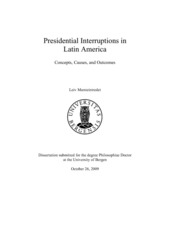Presidential Interruptions in Latin America. Concepts, Causes, and Outcomes
Doctoral thesis
Permanent lenke
https://hdl.handle.net/1956/3848Utgivelsesdato
2010-03-04Metadata
Vis full innførselSamlinger
Sammendrag
This dissertation deals with executive instability in Latin American presidentialregimes, a phenomenon called Presidential Interruptions. The dissertation analyses 14cases of presidential interruptions in Latin America in the period between 1980 and2005, and aims to enhance the understanding of presidential interruptions, analyse thecauses of presidential interruptions in Latin America, and explore the outcomes ofpresidential interruptions in the region.Conceptually this dissertation situates presidential interruptions as a form of executiveinstability between the democratic breakdown and the unscheduled change ofgovernment in parliamentary regimes. The dissertation compares directly the causesof presidential interruption with the causes of democratic breakdown and finds thatwhile the similarities exist, the differences are stark. This finding seriously questionsthe frequently used analogy between the two types of instability. Furthermore, thedissertation compares the procedures for presidential interruption with the proceduresfor unscheduled changes of government in parliamentary regimes, and shows thatprocedures of presidential interruptions indeed are similar to the procedures used inparliamentary regimes for early executive removal. The differences, on the otherhand, are that in parliamentary regimes these procedures are constitutional andlegitimate, whereas in presidential regimes the extent to which procedures forpresidential interruptions are constitutional and legitimate can be questioned.The causal analysis distinguishes between triggering and underlying causes ofpresidential interruption. Entering the debate of institutions vs. the streets, thedissertation finds that street, or vertical, challenges are the more important triggers ofpresidential interruptions in Latin America, whereas institutional or horizontalconflicts are more important than the vertical or street conflicts as underlying causesof presidential interruption. The distinction between triggering and underlying causesis new, and helps explain the disagreement in this debate among other scholars.Further unravelling the causes of interruptions, the dissertation points to theemergence of new cleavages and social and political groups challenging the statusquo, as important causal factors explaining the occurrence of both challenges topresidents, and presidential interruptions. The dissertation uses both statistical andmore qualitative analytical techniques to support this argument.The outcomes of presidential interruptions, it is argued, depend on the principalcauses for the presidential removal. The dissertation argues that a presidentialinterruption is a way of holding the chief executive accountable for his or her actionsor omissions, and therefore should be understood as a reactive sequence. Inductivelythe dissertation identifies three types of interruptions, and shows through a qualitativecomparative analysis that the outcomes of presidential interruptions depend on theprincipal cause of the interruption, and thus the type of interruption. The three typesare interruptions motivated by: a presidential scandal, a president’s democraticviolation, and a president’s policies.
Utgiver
The University of BergenOpphavsrett
Leiv MarsteintredetAll rights reserved
